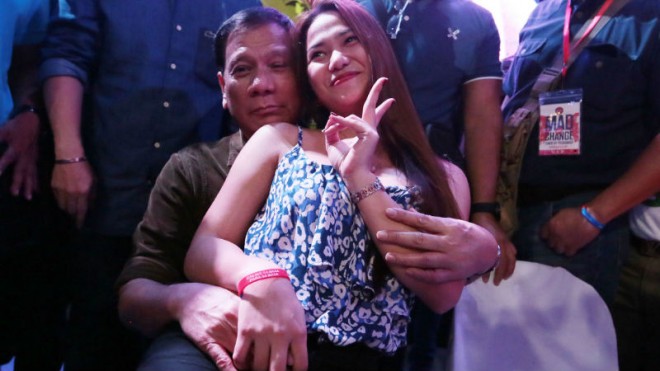
NO LAP DANCE HERE A female supporter of Davao City Mayor Rodrigo Duterte, presidential candidate of PDP-Laban, sits on his lap at the MAD for Change event at McKinley West Open Field in Taguig City. GRIG C. MONTEGRANDE
It seems no one can throw the book at presidential aspirant and Davao City Mayor Rodrigo Duterte, whose recent expletive-peppered press conference turned into a bleepathon when it was aired on television—particularly on TV5.
READ: Duterte shocks, awes
The gender-sensitive and politically correct audience were naturally scandalized, but the question begs to be answered: Can anyone censor, or at the very least censure, the politician for his colorful, and some say offensive, language?
Eugenio “Toto” Villareal, chair of the Movie and Television Review and Classification Board (MTRCB), told the Inquirer that since the Duterte press conference was aired as a newscast, “it is not within the government agency’s jurisdiction as mandated by PD No. 1986.”
Presidential Decree No. 1986, which created the MTRCB, gave the board the power “to screen, review and examine” movies and television shows.
However, news programs are protected by the constitutional provision on the freedom of expression and of the press.
In its 2004 Implementing Rules and Regulations, the MTRCB defined news programs as “straight and objective news reporting as distinguished from news analyses, commentaries, opinions and editorials… which are subjective in nature.”
Villareal explained that according to Section 7 of PD No. 1986 “newsreels (interpreted as straight news) are excerpted from MTRCB jurisdiction.”
Luchi Cruz-Valdes, head of the news and public affairs department of TV5, told the Inquirer that the network had no official statement on the controversial Duterte press conference.
She explained that “it was a live coverage and there was no way to take out unairables. But we did edit out the expletives in all subsequent packaged reports on television as well as online.”
Valdes reiterated that the network “does not see the need to adjust any policy at the moment.”
TV5’s handling of the Duterte case in subsequent airings showed an example of “self-regulation.”
Villareal said that it’s best for networks to practice self-regulation. “The Kapisanan ng mga Broadkaster ng Pilipinas (KBP) can also come in [when issues crop up],” Villareal said.
The KBP, an organization composed of owners and operators of radio and televisions stations “aims to advance and sustain the highest standards of quality in the broadcast industry.”
RELATED STORIES
De Lima on Duterte’s cussing: Is he serious? Nakakahiya!
CBCP hits Duterte; hits back on its child abuse
Archbishop hits Duterte: Corruption is a devil with many faces